Enough time has gone by that a large number of today’s hockey fans do not realize that the New Jersey Devils were once the Colorado Rockies. And even before that, the franchise began as the Kansas City Scouts. After the team’s inception into the NHL for the 1974-75 season, their time as the Scouts lasted for all of just two seasons before poor attendance and debt among owners contributed to the club relocating to Denver, Colorado.
Sign up for our NHL History Substack newsletter
From 1976-77 up through the 1981-82 NHL season, the franchise played out of McNichols Sports Arena as the Colorado Rockies. They were a colorful hockey team to say the least. Flamboyant hockey legend Don Cherry was the team’s head coach for the 1979-80 season. The Rockies are also widely credited as the first sports team to utilize the anthem “Rock and Roll Part 2”, otherwise known as “The Hey Song”, to celebrate goals scored at McNichols. Their colors were blue, red, gold and white, although the blue came across as more of a dark-purple in color – unique to say the least.
Despite making the playoffs only once in their six NHL seasons, the Rockies did in fact have a fair amount of God-given talent on their roster. The trouble was, they just did not have enough of it. Not even close. While in any given season they housed three or four players who were of All-Star caliber or at least above average, the remainder of the team was heavily beleaguered. A few won Stanley Cups in their respective careers and one player is even in the Hockey Hall of Fame.
As we look back on a team that has not been in existence for nearly 40 years, it is important for the sake of hockey history to recall the 10 best Colorado Rockies players.
10) Doug Favell (1976-1979)
By the time that goaltender Doug Favell was traded from the Toronto Maple Leafs to the Rockies in Sept. 1976, he was already a well-established NHL netminder. In fact, he had been an original member of the Philadelphia Flyers and had nine seasons of NHL hockey already under his best. Favell would end up playing three seasons for the Rockies after his arrival, and although he would split the goaltending duties namely with Michel Plasse, he would still be the team’s top man between the pipes.
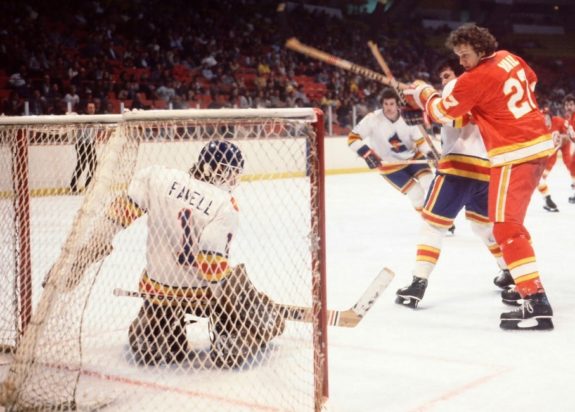
The most important aspect of Favell’s time with the Rockies was that he was the only goaltender to play for them in the postseason. In a remarkably poor Smythe Division during the 1977-78 NHL season, the 19-40-21 woeful record of the Rockies was still good enough to get them into the playoffs. Their 59 points placed them at second in the division behind the Chicago Blackhawks. Unfortunately, the Rockies would be swept in two straight games by the Philadelphia Flyers in a best-of-three opening-round playoff series. Favell was in net for both games and came away with a 3.00 goals-against average after allowing six goals in the two games.
Much of the team’s “success” that season and the fact that they even got into the playoffs can be strongly attributed to the play of Favell in net. Without much help in front of him, he actually played a decent season. Favell’s record of 13-20-11 in 47 appearances saw him lead all Rockies goalies in games played, wins and ties. His 3.58 GAA was also tops among Colorado’s four goalies to see action that year, and he was the only one to record a shutout.
In his three years as a Colorado Rockies goalie, Favell went 21-40-16 in 84 games with a 3.84 GAA and a lone shutout.
9) Ron Delorme (1976-81)
Ron Delorme is one of only two Rockies to have played in at least 300 regular season games with the team. Originally drafted by Kansas City in the fourth round of the 1975 NHL Amateur Draft, he played five seasons with the franchise in Colorado. One of the more key aspects of Delorme’s game was his shooting accuracy for the Rockies. Through his five seasons with the team, his shooting percentage came out to be 18.6%. Delorme was also a willing combatant on the ice too, and had no hesitancy in dropping the gloves. He could be tough as nails, checked hard, did not back down from anyone. Knowing that he possessed an accurate shot was an added bonus.
Delorme’s finest shooting percentage (a whopping 23.5%) came during the 1978-79 season when he also generated the highest goal total of his career by scoring 20 that season. While he only had eight assists that same year, it was the 20 goals that mattered most as he was one of five Rockies to reach that plateau. Colorado desperately needed Delorme’s scoring that year, as 1978-79 would be the lowest amount of goals (210) that the team would generate during their six years in Colorado.
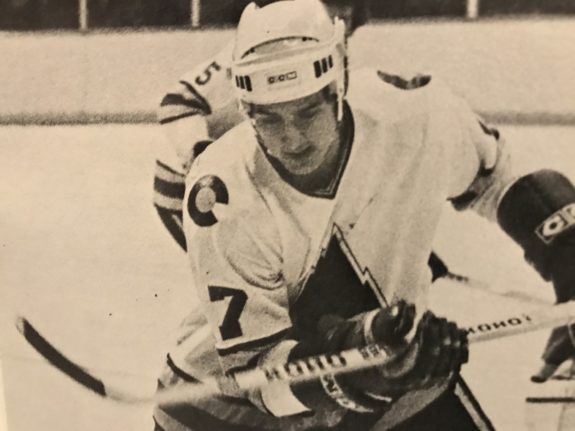
The 1978-79 season was Delorme’s crest for goal production. Leading up to that point he had seasons of six and 10. After hitting 20, his final two years with Colorado would drop to 19 and 11. Still, in his seasons of six and 19 he made his shots count as his shooting percentage was 19.4% in both years.
After a disappointing 1980-81 season when Delorme scored just 11 goals in 65 games, he would end up being claimed on waivers by the Vancouver Canucks in Oct. 1981. He played four more seasons in the NHL with the Canucks, including their 1981-82 run to the Stanley Cup Final. Delorme’s totals with the Rockies ended up being 66 goals and 61 assists for 129 points in 314 games.
8) Gary Croteau (1976-80)
Like Delorme, Gary Croteau is another player who brought consistency to the Rockies. After Kansas City selected him from the California Golden Seals in the 1974 NHL Expansion Draft, he was an original member of the franchise who ended up being with the club for a total of six seasons between both the Scouts and the Rockies. Once the franchise relocated to Colorado, Croteau put forth the finest NHL seasons of his 12-year career.
His best season came during the team’s first year in Denver (1976-77) when he scored 24 goals in 78 games at the age of 30. Croteau added on 27 assists that year too to give himself 51 points on the season, which was good enough for third best on the team. The 24 goals and 51 assists would be the highest totals of his NHL career.
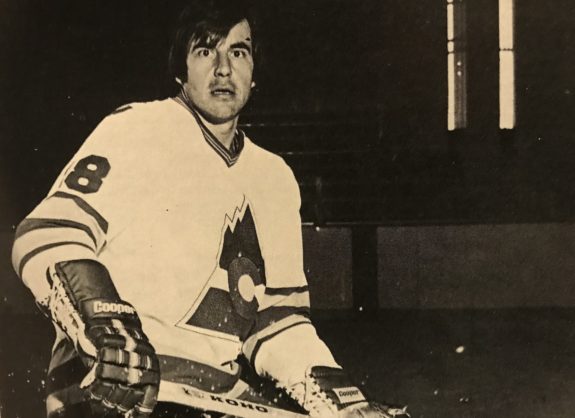
Another fine performance was had by Croteau during his last full season in the NHL during the 1978-79 season. His 23 goals in 79 games would be the second-highest goal total in a season for his career. Croteau scored them with a mere 104 shots on net to have a superb shooting percentage of 22.1%.
In 234 games with the Rockies Croteau scored 65 goals and 71 assists. That total of 136 points ranks as the fourth best in the team’s history during their six years in Colorado.
7) Rene Robert (1979-81)
One-third of the Buffalo Sabres fabled “French Connection” line, the trio was broken up for good when Scotty Bowman who was Buffalo’s general manager at the time shipped Rene Robert to the Colorado Rockies for defenseman John Van Boxmeer in return. This trade worked well for both parties, at least initially. The Sabres received a defenseman who generated seasons of 40, 51 and 54 assists, while the Rockies received a new leading scorer in Robert.
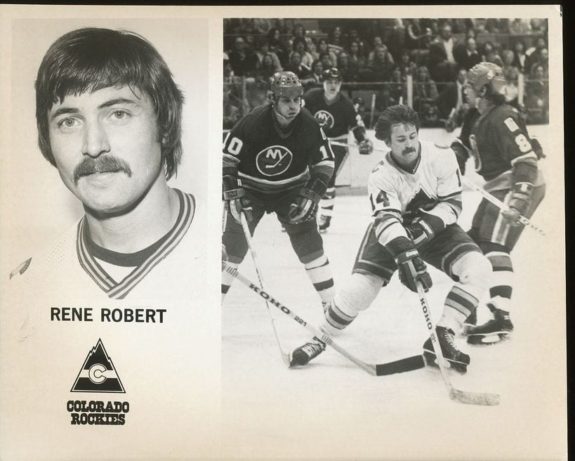
The arrival of Robert in Colorado was yet another instance in Rockies’ lore of wishing a player had been given more time and had a larger supporting cast surrounding him. Though he was 31 years old during the 1979-80 season, Robert still was producing and put forth a fine season – one that demonstrated he could score on his own, separate from Rick Martin and Gilbert Perreault. In 69 games that year, he led the Rockies in goals (28) and points (63), making him nearly a point per game player. 10 of Robert’s goals came on the power play – tops as well for the Rockies in that category – while 16 of his 35 assists were also with the man advantage.
Despite the team-leading performance in only his first year with the club, the Rockies parted ways with Robert midway through the 1980-81 season. Oddly enough, they did not get much in return for him. Colorado traded the forward to Toronto in exchange for a third round selection in the 1981 Entry Draft. Prior to the trade Robert had eight goals and 11 assists for 19 points in 28 games for the Rockies.
For a 1980-81 Colorado team that ended up scoring the most goals in Rockies history (258), it makes one wonder that if they had kept Robert could the team finally pull itself out of the doldrums? Sadly, we never had a chance to find out.
6) Barry Beck (1977-80)
Barry Beck was about as big and as strong of hockey player that you could possibly find during the 1970s. While being 6-foot-3 and 215 pounds is common in today’s NHL, when the Rockies drafted Beck with the second overall pick of the 1977 NHL Amateur Draft he was very much a giant by hockey standards at the time. But it was not just size that he brought to the team. Despite being a big man, Beck was capable of generating a generous amount of offense coming from the point, and excelled at both ends of the ice throughout his career.
As would occur more than once in Rockies’ history, a high draft choice like Beck was expected to be not only the face of the franchise but the savior of the franchise as well. Those expectations were rather unfair for the big man. Beck was certainly a very talented defenseman, but even his sizable shoulders were not enough to bare the weight of the struggling Rockies. Still, he made a difference in the team and for just over two years was the Rockies’ best defender.
The 1977-78 season would be Beck’s rookie year in the NHL, and it was a most successful one too. In 75 games that year he fired away 22 goals and added 38 assists to have 60 points on the year. Excellent numbers for any rookie, let alone a rookie defender. It also earned him a nod for that year’s NHL All-Star Game.
In his sophomore season with the team Beck’s numbers dropped a bit. Playing in 63 games, he scored 14 goals and 28 assists for 42 points. While still respectable numbers for any blueliner, Beck would end up being traded from the Rockies to the New York Rangers on Nov. 2, 1979 in exchange for Lucien DeBlois, Pat Hickey, Dean Turner and future considerations. This seems to be a prime example of a team giving up too early on a player. One has to wonder what differences there would have been for the Rockies had they kept hold of Barry Beck for another two or three years instead.
5) Mike Kitchen (1976-1982)
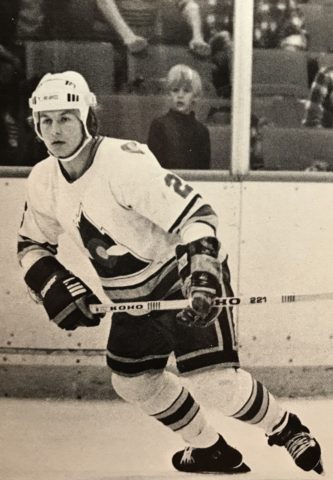
Mike Kitchen is the only player to have played for the Rockies in all six seasons that the franchise was in Colorado. His longevity alone would earn him a spot on our list, but he was also a very capable defender as well. Not overly big at 5-foot-10 and 180 pounds, Kitchen was solidly built and played much larger than his actual size on the ice.
The Scouts selected him in the third round of the 1976 NHL Amateur Draft before the team went to Colorado. Kitchen would make his debut with the team during the first season in Denver. He would suit up for 60 games as a rookie defender and scored his first NHL goal on Nov. 17, 1976 in 6-3 loss to the Atlanta Flames. Kitchen tacked on eight assists that year too to give himself nine points as a Rockies rookie.
Kitchen’s finest season statistically speaking was that same year in which they made the playoffs, 1977-78. In 61 games he scored two goals and assisted on 17 others to set career highs in both assists and points. Kitchen would also play in both Rockies playoff games in the losing effort against the Flyers.
He would remain a dependable mainstay for the Colorado blueline, and up through their first two years in New Jersey as well. Not surprisingly, Kitchen possesses the Rockies record for most games played with 354. His 50 assists for the team ended up being 13th overall for that category.
Since his playing days ended, Kitchen went on to win two Stanley Cups with the Chicago Blackhawks in 2013 and 2015 as an assistant coach to Joel Quenneville.
4) Glenn “Chico” Resch (1980-82)
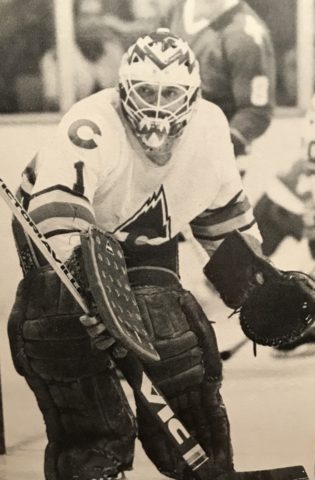
Obtaining Glenn “Chico” Resch from the New York Islanders was a major blessing for the Colorado Rockies. Coming off a Stanley Cup victory, and with Billy Smith and Rollie Melanson playing strong in goal for the Isles, Resch became expendable. The Rockies got a much better deal than the Islanders in all actuality, as Colorado received not only Resch but Steve Tambellini, while they gave up defenseman Mike McEwen – a decent defender who helped continue the Cup success – and goaltender Jari Kaarela, who never played a single game for New York. More importantly, Resch was now a Stanley Cup winning goaltender who brought a winning mindset to the Rockies.
Unfortunately, the winning ways of the Rockies newly acclaimed Islanders would not be enough to bring forth continuous victories for their new squad. This scenario plagued Colorado through their existence, but it certainly was not for lack of effort by Resch. After arriving to the Rockies in Mar. 1981, he easily became the team’s most valuable player and handled the bulk of the workload.
This was never more apparent than in the team’s final season of 1981-82. Resch suited up for 61 games – the most played in a single season ever by a Rockies goaltender. He battled hard enough to a compile a record of 16-31-11. Resch’s 16 victories are the Rockies’ record for most wins in a single season by a goaltender.
Once the team moved to New Jersey, Resch remained with them for more than three more seasons. Though he played in Colorado for less than two years, “Chico” Resch is easily the best goaltender to have suited up for the Rockies.
3) Lanny McDonald (1979-1981)
Had Lanny McDonald played more than his one full season and parts of two others with the Rockies, he likely would have been at the very top of our list. However, he also likely would have never won the Stanley Cup and may not have ever been inducted into the Hockey Hall of Fame.
Still, McDonald’s brief layover in Colorado ranks him high on our list because of how effective and how productive he was in a relatively short period of time. He is one of only three different players in Rockies’ history to score 30 goals or more in a season. In fact, he actually potted 40 goals during the 1979-80 season after the Maple Leafs traded him to Colorado with Joel Quenneville in exchange for Pat Hickey and the individual who is number one on our list (more on him shortly) on Dec. 29, 1979. McDonald’s 15 goals with the Leafs that year combined with the 25 he scored upon arriving in Colorado put him at 40 exactly.
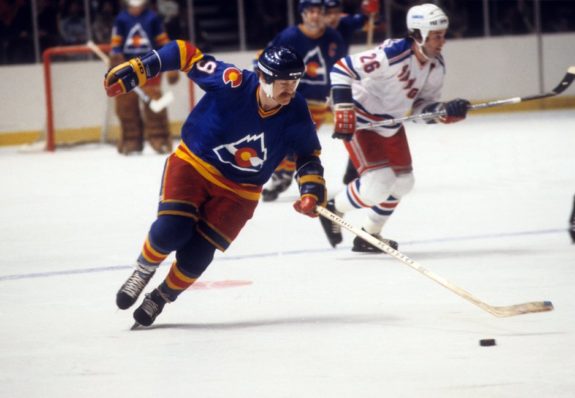
McDonald would spend the entire 1980-81 season with the Rockies, and he was rather fantastic. Playing in all 80 games that year, he easily led the team in all major offensive categories with 35 goals, 46 assists and 81 points to be more than a point-per-game player. In McDonald’s 16 NHL seasons, those 81 points were his the seventh-highest yearly point total in his career.
He would play briefly for the Rockies at the beginning of their last season in Colorado (1981-82) before being traded to the Calgary Flames on Nov. 25, 1981. Prior to the trade, McDonald had scored six goals and nine assists for 15 points in 16 games. Fortunately for McDonald however, the trade to the Flames saw him play seven more seasons of NHL hockey. During the 1988-89 season – his last in the league – McDonald scored his 500th goal, 1,000th point and won the Stanley Cup.
While much is said about McDonald’s time with Toronto and Calgary, little is ever acknowledged of his time with the Rockies. This is rather unfortunate, because his numbers in Colorado were quite good. In 142 games as a Rockie, McDonald scored 66 goals and 75 assists for 141 points. He would also have 19 power play goals and six game-winners.
2) Rob Ramage (1979-1982)
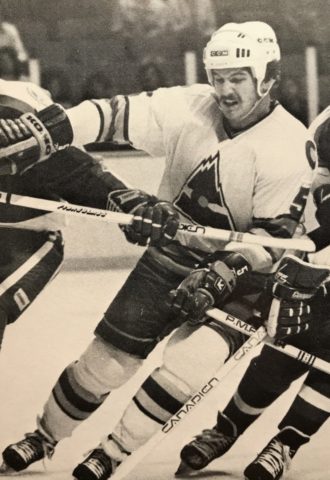
Defenseman Rob Ramage was drafted as another player who could save the Colorado Rockies franchise and turn things around. While he played admirably well and is recalled as one of our top players in the team’s history, he could not do it all on his own. Ramage was drafted by the Rockies with the number one overall pick of the 1979 NHL Entry Draft, and was quickly given a baptism by fire. An unfair situation to put any young player into, one cannot look back on the history of the Rockies and say that he did not give it his all.
At 6-foot-2 and 210 pounds, Ramage played as a very robust, physical blueliner throughout his entire 15-year NHL career. The first three of those years were spent with the Rockies. In his rookie season (1979-80) he registered eight goals and 20 assists for 28 points in 75 games, while also tacking on 135 penalty minutes. That penalty minute total was the highest for all Colorado players that year.
Ramage’s finest season with the Rockies came during his sophomore season of 1980-81 when he scored 20 goals from the back end and added 42 assists in 79 games to finish third on the team in scoring behind McDonald and Merlin Malinowski. He was utilized as the number one defenseman in all situations for Colorado, and that is accounted for in his 12 power play goals, three game-winners, and one shorthanded tally during that same season. His play that year also earned Ramage a selection to the 1981 NHL All-Star Game.
For the last year in Colorado, Ramage served as the Rockies team captain. The 201 penalty minutes he put up in the 1981-82 season ended up being the highest total in Rockies’ history. Ramage would not join to team in New Jersey for the 1982-83 season, as he was traded to the St. Louis Blues in Jun. 1982 in return for the Blues’ top draft selection in the 1983 NHL Entry Draft.
Ramage would go on to win two Stanley Cups in his career, one of them being alongside McDonald with the 1988-89 Flames. He would win his second Cup with the 1992-93 Montreal Canadiens. Ramage’s final totals with the Rockies amounted to 41 goals, 91 assists and 132 points in 234 games. He also had 529 penalty minutes with the club and scored a solid total of 22 power play goals.
1) Wilf Paiement (1976-1979)
It should not be surprising, but original member of the franchise and longtime NHLer Wilf Paiement is at the very top of our list. When the Scouts took part in their first NHL Amateur Draft in 1974, they selected Paiement second overall. He would remain as the face of the franchise for five and a half seasons before being shipped to Toronto in the trade that landed McDonald. Prior to his departure though, Paiement did just about everything he could to make the team viable.
Paiement scored 356 goals during his 14-year NHL career. Perhaps somewhat surprisingly, his highest goal total came during his time with the Rockies. During the 1976-77 season Paiement scored 41 goals in 78 games. This would remain the highest number in a season for his career, and is forever a Rockies record too. In fact, it remained the highest goal total in franchise history until Pat Verbeek scored 46 for the Devils in the 1986-87 season. To this day, those 41 by Paiement are still within the top ten in the longstanding history of the team through all three cities where it has been located.
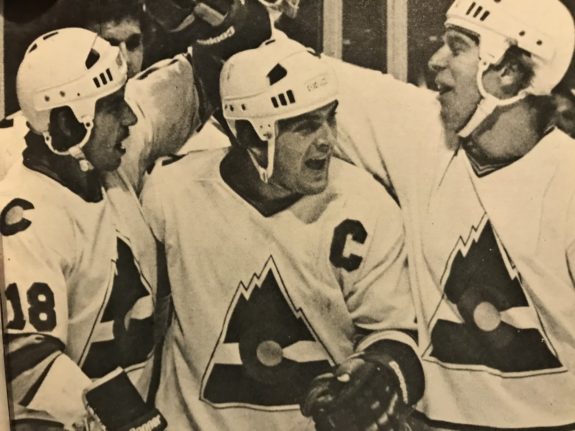
Paiement’s accolades do not end there either. During the 1977-78 season it was his point production that pushed Colorado into the playoffs. Playing in all 80 games that year Paiement scored 31 goals, but would also add 56 assists to have a team leading total of 87 points that year. The 56 assists and 87 points are records for the Rockies as well.
Not including his time spent with the Scouts, Paiement played 257 games solely with the Rockies. In that time he scored 106 goals and 148 assists to have 254 points within those games. He also was chosen to represent the Rockies at both the 1977 and 1978 NHL All-Star Games. Paiement is arguably the most important player to the team’s history in Colorado and rightfully sits at the very top of our list.
* originally published in April 2018
